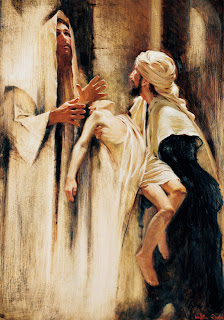Mark 9:19-24
19 He answereth him, and saith, O faithless generation, how long shall I be with you? how long shall I suffer you? bring him unto me.
20 And they brought him unto him: and when he saw him, straightway the spirit tare him; and he fell on the ground, and wallowed foaming.
21 And he asked his father, How long is it ago since this came unto him? And he said, Of a child.
22 And ofttimes it hath cast him into the fire, and into the waters, to destroy him: but if thou canst do any thing, have compassion on us, and help us.
23 Jesus said unto him, If thou canst believe, all things are possible to him that believeth.
24 And straightway the father of the child cried out, and said with tears, Lord, I believe; help thou mine unbelief.
This man’s initial conviction, by his own admission, is limited. But he has an urgent, emphatic desire in behalf of his only child. We are told that is good enough for a beginning. “Even if ye can no more than desire to believe,” Alma declares, “let this desire work in you, even until ye believe.” With no other hope remaining, this father asserts what faith he has and pleads with the Savior of the world, “If thou canst do any thing, have compassion on us, and help us.” I can hardly read those words without weeping. The plural pronoun us is obviously used intentionally. This man is saying, in effect, “Our whole family is pleading. Our struggle never ceases. We are exhausted. Our son falls into the water. He falls into the fire. He is continually in danger, and we are continually afraid. We don’t know where else to turn. Can you help us? We will be grateful for anything—a partial blessing, a glimmer of hope, some small lifting of the burden carried by this boy’s mother every day of her life.” (2013 April General Conference, “Lord, I Believe”, By Jeffrey R. Holland)
- Is it dishonest to declare faith when you have doubt?
Brothers and sisters, this is a divine work in process, with the manifestations and blessings of it abounding in every direction, so please don’t hyperventilate if from time to time issues arise that need to be examined, understood, and resolved. They do and they will. In this Church, what we know will always trump what we do not know. And remember, in this world, everyone is to walk by faith. (2013 April General Conference, “Lord, I Believe”, By Jeffrey R. Holland)
Sometimes the doubt is answered sometimes not, which can be uncomfortable.
The Savior, describing faith, said in Alma 32:27 -
27 But behold, if ye will awake and arouse your faculties, even to an experiment upon my words, and exercise a particle of faith, yea, even if ye can no more than desire to believe, let this desire work in you, even until ye believe in a manner that ye can give place for a portion of my words.
- How can we hold on to the faith that we do have?
A 14-year-old boy recently said to me a little hesitantly, “Brother Holland, I can’t say yet that I know the Church is true, but I believe it is.” I hugged that boy until his eyes bulged out. I told him with all the fervor of my soul that belief is a precious word, an even more precious act, and he need never apologize for “only believing.” (2013 April General Conference, “Lord, I Believe”, By Jeffrey R. Holland)
There is a place for all of us, no matter where we are on the scale of belief.
What was once a tiny seed of belief for me has grown into the tree of life, so if your faith is a little tested in this or any season, I invite you to lean on mine. I know this work is God’s very truth, and I know that only at our peril would we allow doubt or devils to sway us from its path. Hope on. Journey on. Honestly acknowledge your questions and your concerns, but first and forever fan the flame of your faith, because all things are possible to them that believe. In the name of Jesus Christ, amen. (2013 April General Conference, “Lord, I Believe”, By Jeffrey R. Holland)




